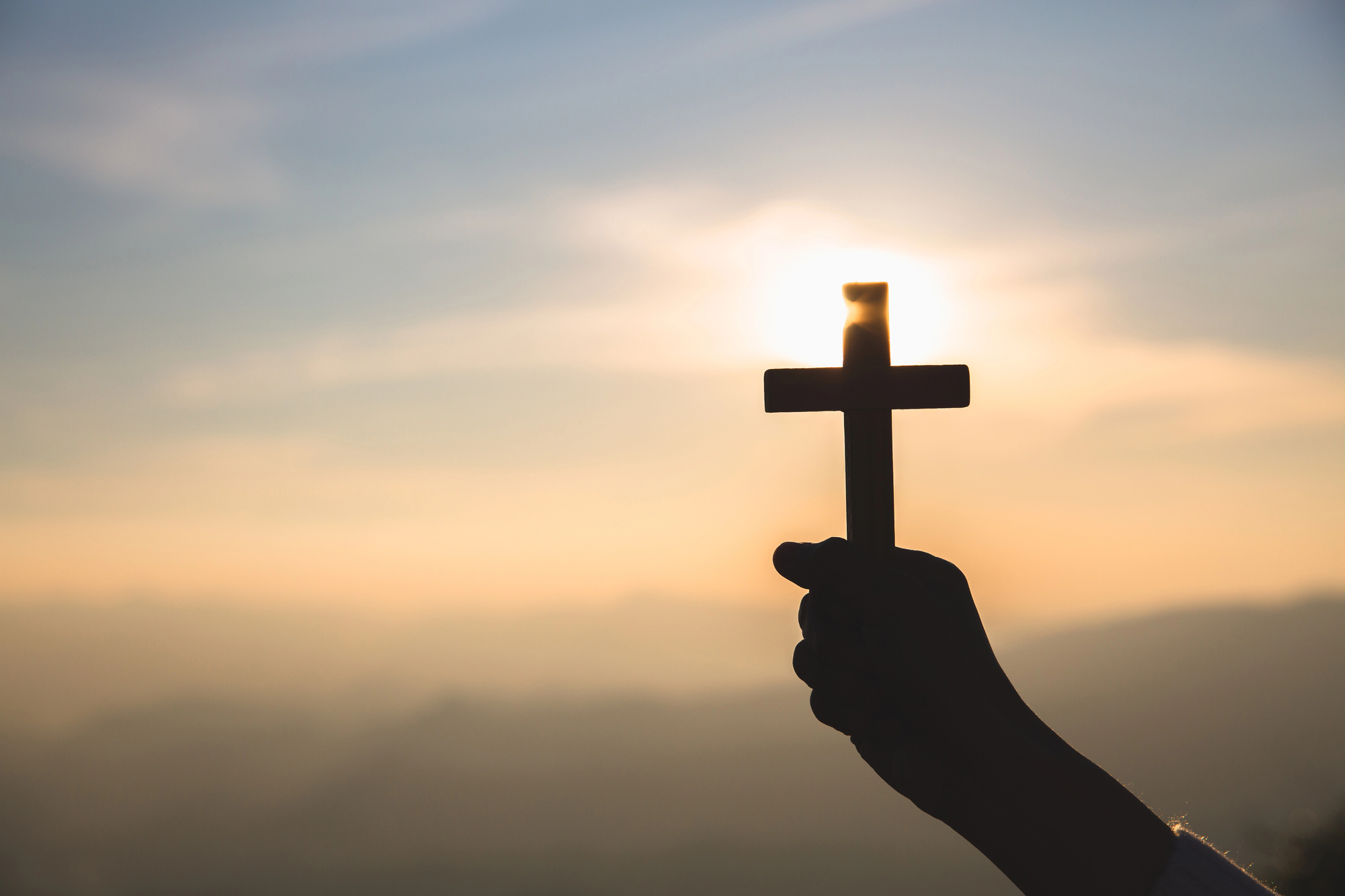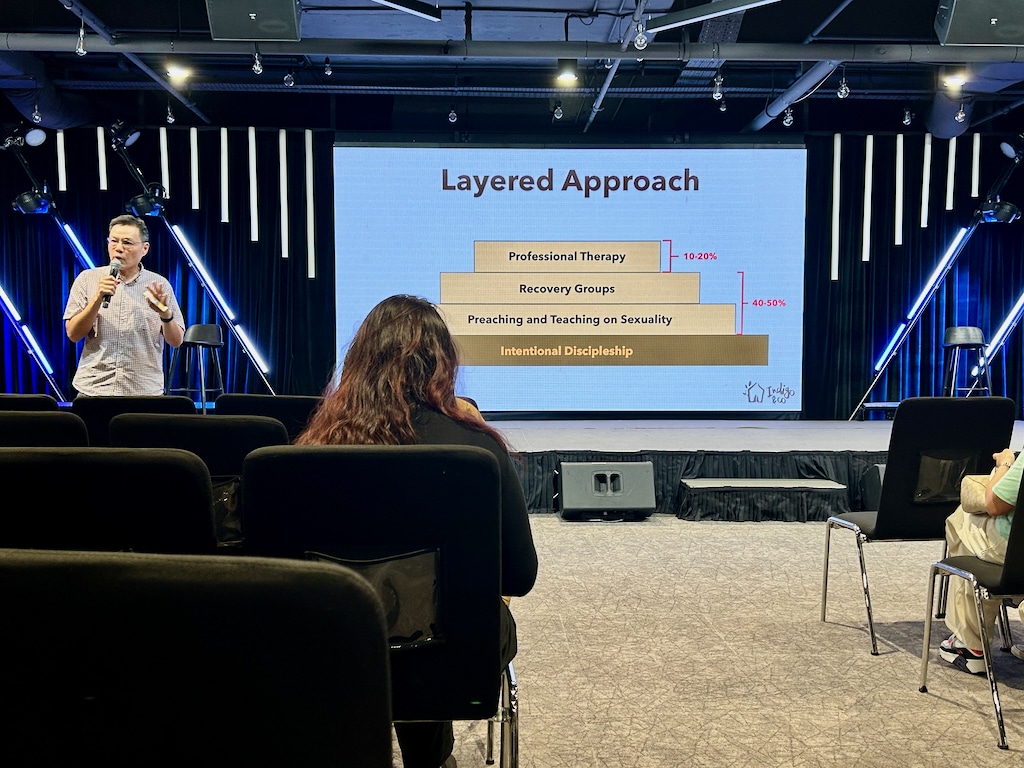What can churches do to create a safe space for those struggling with pornography?
by Gracia Chiang // April 25, 2025, 6:16 pm

What would it take for the Church to be a place where Christians feel safe to bring their sin into the light? Photo from Depositphotos.com.
Christians struggling with pornography use are often reluctant to seek help because of the fear of being judged. How then can churches create a culture of safety so that healing can happen?
In our first article sharing highlights from Salt&Light‘s Uncomfortable Conversations: The Church and the Porn Pandemic, we looked at key trends for porn addiction based on latest data from Barna.
One of the grim findings? Many pastors are also silently struggling with porn use.
This second article focuses on practical steps that ministry leaders can take in the fight against porn, whether to help themselves or others.
The following points are largely taken from the Q&A session, which featured advice from the following speakers:
- Dr Ng Liang Wei, Director, Sexual Wholeness Services, Lakeside Family Services and Executive Director, Indigo & Co.
- Jeffrey Pang, Counsellor, Indigo & Co.
- Ps Too Teh Hsin, Retired Pastor, Agape Baptist Church
Church leaders can model vulnerability
“It starts from the top – recognising that all of us are simply broken, whether you’re an elder or a pastor,” said Jeffrey. “If we can recognise that, it sets a culture that we’re all sinners saved by grace.”
Agreeing that having that element of grace is important, Ps Too observed that often the preaching in church emphasises on what one should or should not do.
“If we can recognise that all of us – even elders and pastors, are broken – it sets a culture that we’re all sinners saved by grace.”
“Those are important things, but we can never meet those requirements specified in the Bible. We’re sinners saved by grace,” he said.
When a pastor also starts to share his or her own struggles over the pulpit, that allows others to be open about their journey too.
“That’s one way of telling the congregation, ‘I’m also not perfect. I’m just struggling with different things just like the rest of you.’ That will create some space for people to say, ‘I’m struggling with this or that.'”
Ps Too recounted how he had come forward with his own testimony at a church camp many years ago because he had experienced some degree of freedom from sexual addiction.
While he was not a pastor yet at that time, Ps Too revealed that he had the courage to do so because his church had a culture of openness and the destructive power of lust had also been preached before.
“That gave me the comfort to think that I could actually confess my sexual sin and would not be expelled from the church.”
Eventually, that led to the formation of a men’s ministry in his church where they could come together to talk about their struggles.

Ps Too (far left) has since shared his story publicly. His desire is to help churches shepherd their flock in the area of sexual brokenness.
However, Jeffrey and Ps Too acknowledged that culture takes time to build. Those in leadership positions might also find it especially difficult to get help.
“If church leaders, pastors or elders are struggling and cannot find help in church, or the culture is not there for them to seek help, they can perhaps go outside the church,” advised Jeffrey.
For example, Indigo & Co. sees senior church leaders come into their counselling room, but all conversations are confidential. “Nobody needs to know about it.”
Sharing that he has also journeyed with pastors from other churches, Ps Too suggested: “Find another brother or sister that you can trust – just someone that you can confess your struggle to. At least someone can walk with you and pray with you, and then maybe together you can seek some additional help.”
Allow those in ministry to work on personal issues
Coming from a more structural perspective, Dr Ng pointed out that some of these struggles could also be dealt with much earlier on in a minister’s life.
For instance, those seeking admission to seminaries or pursuing theological education could be asked to address these issues specifically as part of the curriculum.
In addition, churches can take little steps such as allowing ministers to take themselves out of their work for a season if needed.
It does not have to be because of sexual sin. It could be a struggle with anger or other issues. In summary, start small.
“When leaders are allowed to go on for too long with internal issues, it will eventually harm the members.”
“When we are self aware that something is impacting us negatively and we take ourselves out early, or God gives us an opportunity to remove ourselves early from that situation, it’s a means of grace and a means by which God loves us before the problem gets bigger.”
Pastor sabbaticals are also beneficial.
“Typically, the sabbaticals have the potential for an extended time to join ministries,” noted Dr Ng.
“That can form part of your recovery as well. Because when you take a break, then you can actually reflect on some of these things that will protect you and your family.”
Sounding a word of caution, he said: “When leaders are allowed to go on for too long with internal issues, it will eventually harm the members and the issue will explode in the face. It’s important to really start early because the downstream impact can be really big.”
Identify triggers
It can be helpful when leaders allow themselves to be taken out of ministry for a season because their work could be the very thing that triggers them, said Dr Ng.
Giving the example of a church leader whom he mapped out a recovery plan for, Dr Ng shared: “I realised that his pornography (use) spiked every time on a Sunday afternoon. Because when you prepare for the sermon, you’re stressed. Then on Sunday afternoon, you’re quite free right? So the lapse happened.
“I think it surprised him that there was a very tight link to public ministry.”
In such a case, there are strategies that one can adopt, such as inviting guest speakers to preach for a period of time to give yourself the opportunity to recover.

Knowing the trigger determines what action to take, said Dr Ng and Ps Too. Photo from Depositphotos.com.
Addressing a question from a participant who has been helping a youth with his porn use, Ps Too likewise highlighted the need to uncover triggers.
“Find out what triggered him. How did he get to that point? Because usually it starts from somewhere,” he said.
“Maybe he saw something on the phone, or he saw something on the MRT or in the office and a thought was planted in him. And then when he’s alone at night, he wants to complete the cycle of sin.”
For instance, if it is because of something he saw on the MRT, the “battle plan” is for him to guard his eyes when he is on the MRT instead of waiting until he is at home.
Seek to understand and connect
Speaking from his experience of journeying with young people, Dr Ng said the first thing he does when someone comes to him for help is to give them confidence that this is a struggle that they can overcome together.
“Develop a culture of accountability in the context of loving relationships … and not like a bank chasing for late payments.”
“Sometimes I give them a bit of homework.” After encouraging them and setting up a follow-up meeting, he might ask them to write down the kind of porn they like to watch and why.
“If the person always watches porn that is about being close to another woman, he may have emotional longings,” he explained.
“If he likes to watch porn where he is always in the dominant role, he may be the subject of bullying in school because porn is a world of escape.”
The value of such an exercise is so that you can “get a window” into what is really going on and better meet underlying needs.
“It gives the church an opportunity to develop a culture of accountability in the context of loving relationships that are interested in the other person’s life – and not just accountability like a bank chasing for late payments.”
Take steps to restrict access
Having said that, if a youth reaches out in the middle of the night and is tempted, “in the heat of the moment when he calls you, the main thing is to help him to escape”, said Ps Too.
“So maybe he has to sleep in the living room that night. Don’t sleep in the bedroom and close the door. That would be asking for trouble.
“You can’t just do Bible study because it involves addiction, family, shame and guilt, isolation, attachment trauma injuries.”
“Or if possible, go out of the house, go for a run. Do something away from the house where he cannot complete the cycle of masturbation.”
In addition to praying with someone who comes to you for help, Jeffrey offers these practical tips.
“Don’t sleep with your handphone or device in your room,” he said.
“Don’t put tissue paper in the room; put it outside. Don’t close your door when you sleep. Don’t use air-con; use the fan.”
A longer-term solution could involve installing filtering apps such as Covenant Eyes or Qustudio to block out inappropriate content.
Dr Ng added: “Sometimes I just give them some simple advice: When tempted, just stand up. And then send a text or something like that.
“So you just drum that same word into their head and it’s a first-aid bandage. After that, then you look at the layered approach.”

Referencing Christian author Josh McDowell who has been researching the issue of porn, Jeffrey emphasised that “almost nobody gets out of porn addiction alone”. That is why there is so much power in groups.
To tackle the problem of porn use in the Church, Indigo & Co. proposes a multi-layer solution that can be built over time.
At the base, churches should establish a good foundation of intentional discipleship among members.
Moving upwards, efforts can then be more targeted: Preach and teach on sexuality; form recovery groups where people feel safe to open up and be accountable to one another; and finally encourage those who are steeped in addiction to seek professional therapy.
Sharing about the upcoming initiatives by Indigo & Co., Jeffrey revealed that the local charity is intending to start group therapy in addition to individual therapy.
Besides the talks on the harms of porn that it conducts, Indigo & Co. is also exploring how it can train churches for recovery groups.
“Pure Bible study doesn’t work because you need to deal with the problem holistically,” underscored Jeffrey.
“You can’t just do Bible study and hope to get rid of this problem because it involves addiction, family, shame and guilt, isolation, attachment trauma injuries and so on.”
Indigo & Co. and Lakeside Family Services will also soon launch a Healthy Sexuality Survey together with Focus on the Family Singapore to better understand the needs in churches.
Anyone who is interested in the above initiatives can reach out to [email protected] for more details.
RELATED STORIES:
It’s time to have uncomfortable conversations in the Church. Let’s start with porn
How I was set free from a life of pornography and illicit sex
When porn becomes both a moral and mental health problem: 3 ways we can help our children
From porn to prostitutes, he cheated on his wife for 26 years, but she did the unthinkable
We are an independent, non-profit organisation that relies on the generosity of our readers, such as yourself, to continue serving the kingdom. Every dollar donated goes directly back into our editorial coverage.
Would you consider partnering with us in our kingdom work by supporting us financially, either as a one-off donation, or a recurring pledge?
Support Salt&Light


